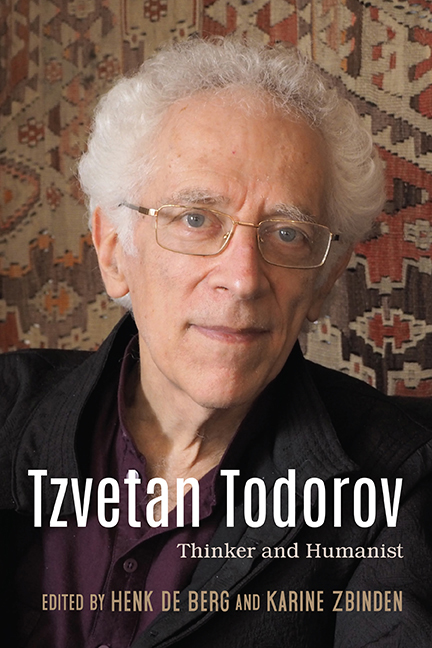Book contents
- Frontmatter
- Contents
- Acknowledgments
- Introduction
- 1 A Marginal Centrist: Tzvetan Todorov and the French Intellectual Field
- 2 Todorov and Camus
- 3 The Enlightenment Redux: Autonomy in Todorov, Glucksmann, and Onfray
- 4 Todorov's Reading of Rousseau: A Heritage for Our Times?
- 5 Tzvetan Todorov's Enlightenment
- 6 Todorov and Bakhtin
- 7 Tzvetan Todorov and the Writing of History
- 8 Tzvetan Todorov and the Trials of History: A Dissenting Voice
- 9 European Integration and the Cultural Cold War: Todorov and Denis de Rougemont
- 10 Tzvetan Todorov on Totalitarianism, Scientism, and Utopia
- 11 Tzvetan Todorov's Political Philosophy
- 12 Interview with Tzvetan Todorov
- Notes on the Contributors
- Index
8 - Tzvetan Todorov and the Trials of History: A Dissenting Voice
Published online by Cambridge University Press: 26 April 2020
- Frontmatter
- Contents
- Acknowledgments
- Introduction
- 1 A Marginal Centrist: Tzvetan Todorov and the French Intellectual Field
- 2 Todorov and Camus
- 3 The Enlightenment Redux: Autonomy in Todorov, Glucksmann, and Onfray
- 4 Todorov's Reading of Rousseau: A Heritage for Our Times?
- 5 Tzvetan Todorov's Enlightenment
- 6 Todorov and Bakhtin
- 7 Tzvetan Todorov and the Writing of History
- 8 Tzvetan Todorov and the Trials of History: A Dissenting Voice
- 9 European Integration and the Cultural Cold War: Todorov and Denis de Rougemont
- 10 Tzvetan Todorov on Totalitarianism, Scientism, and Utopia
- 11 Tzvetan Todorov's Political Philosophy
- 12 Interview with Tzvetan Todorov
- Notes on the Contributors
- Index
Summary
IN HIS BITTERLY ACERBIC NOVEL The Porcupine (1992), Julian Barnes tells the story of “Criminal Law Case Number 1,” the trial in a fictional post-Soviet Eastern European state of the deposed president and Communist Party leader Stoyo Petkanov. Imprisoned by the new, ostensibly democratic government, Petkanov's trial is shown on national television as a historical and political lesson to the people and also as a means to drum up support for the new regime, which is already reeling under the weight of inefficiency and corruption.
Petkanov is initially charged with corruption. But as the courtroom scenes demonstrate, the deposed president skillfully outmaneuvers the young state prosecutor, Peter Solinsky, and successfully refutes the charges brought against him. Solinsky, the son of a high-ranking party official dismissed and exiled by Petkanov, is himself a former communist youth leader. As the case against the erstwhile president begins visibly to fall apart, and as Solinsky and the new government become increasingly desperate, the state police “dig up”—which is to say, fabricate—a new charge against Petkanov. The former president is now accused of having his daughter, whom he had previously appointed minister of culture, killed for “unpatriotic activities.” The charge is ludicrous, but when articulated in the courtroom succeeds in unraveling Petkanov's composure, much to the delight of Solinsky. However, the prosecutor's triumph is short-lived. In a final encounter between the two men in jail, Petkanov tells Solinsky that his victory in the courtroom is meaningless. He states that his conviction will haunt Solinsky from now on because Solinsky has compromised his integrity to secure it. Already abandoned by his wife for his hypocrisy and his willingness to forsake his principles, and justice itself, in the courtroom, Solinsky seeks solace in a church as the novel closes.
In obvious ways, The Porcupine is an exemplary tale of the corruption and abuses of failed communist regimes. At the same time, however, it is an indictment of the so-called democratic regimes that succeeded them. In Julian Barnes's novel, it is such a democratic successor state that puts on a Soviet-style trial, reminiscent of the Moscow show trials of the 1930s. In these trials, history was falsified, crimes were invented, and the accused were wrongly convicted on trumped-up charges, all to serve as a lesson to the people.
- Type
- Chapter
- Information
- Tzvetan TodorovThinker and Humanist, pp. 147 - 158Publisher: Boydell & BrewerPrint publication year: 2020



